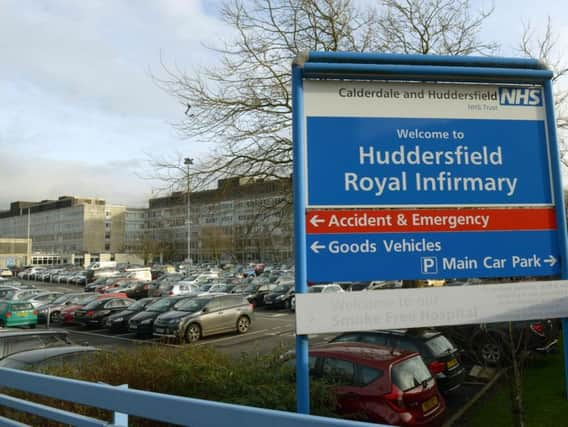Surgery delay at Huddersfield Royal Infirmary cost man's life, investigation finds


A report by the Parliamentary and Health Service Ombudsman (PHSO) states that the man’s death could have been avoided if the Calderdale and Huddersfield NHS Foundation Trust had operated on his twisted bowel.
Also in news: Parents whose 14 year old died of cancer up for top award after fund in his memory tops £100,000
Advertisement
Hide AdAdvertisement
Hide AdMr A, as he is known in the report, was an otherwise healthy 71-year-old man who died when his twisted bowel tore, following serious failings and multiple delays in his treatment at the Trust.
Mr A went to the emergency department at Calderdale Royal Infirmary (CRI) on Christmas day in 2017 with constipation and abdominal pain. The hospital identified the risk of his bowel tearing and that he needed surgery. Mr A was transferred to Huddersfield Royal Infirmary (HRI) hospital the same day.
On 27 December, staff at HRI performed an investigation and recorded the same risk of perforation in clinical notes. Similar conclusions were drawn in a further examination on 30 December. However, it was not until the New Year, on 1 January 2018, a week after Mr A’s initial visit to A&E, that HRI recognised a need for urgent surgery. This was planned for 2 January but was then cancelled and rearranged for 3 January. As a result of the delays, Mr A’s condition worsened, his bowel perforated and he died on 4 January after his organs failed.
The case was brought to the attention of the Ombudsman after Mr A’s sister complained to the Trust and was initially told that the care and treatment was appropriate.
Advertisement
Hide AdAdvertisement
Hide AdThe woman said her brother would have wanted to improve services so that the same mistakes would not happen again.
The Ombudsman found that the Trust failed on more than one occasion to follow national guidance and act on the results of its investigations into Mr A’s condition. The Ombudsman also found that the delay in operating led to his avoidable death.
Also in news: Baroness Warsi says people have been given 'a licence to be racist' since Brexit referendum
Rob Behrens, the Parliamentary and Health Service Ombudsman, said: “This case shows why the guidelines exist and the tragic consequences when they are not followed.
Advertisement
Hide AdAdvertisement
Hide Ad“By carrying out our recommendations and putting an action plan in place the Trust can improve its service to ensure this never happens again.”
Mr A’s sister said: “Thanks to the Ombudsman, we have some justice for my brother and his tragic avoidable death has been highlighted.
“He deserved better than the inadequate treatment and original response to my complaint provided by HRI.
“My brother should still be here today but he would have been happy to know that changes had been made so the same thing won’t happen to anyone else.”
Advertisement
Hide AdAdvertisement
Hide AdAlso in news: Our centralised nation is like Tolkien's Middle Earth with 'one ring to rule them all', says North's newest metro mayor
David Birkenhead, medical director at the Trust, said: “We are always very sorry when our care falls below the standards we expect to deliver. We have apologised and have agreed to the Ombudsman’s recommendations to develop an action plan to prevent a recurrence.
“Again, we would take the opportunity to send our apologies to the family.”
The Trust has agreed to the Ombudsman’s recommendations to develop an action plan to address its failings and outline how it will prevent them happening in the future.
Advertisement
Hide AdAdvertisement
Hide AdAs part of this process the Trust has committed to carry out training on the guidelines for surgeons and improve processes for monitoring high risk patients. It has formally apologised to Mr A’s sister in recognition of the injustice its failings have caused.